Keep your pool running longer through the year at comfortable temperatures with a new pool heater.
BobVila.com and its partners may earn a commission if you purchase a product through one of our links.
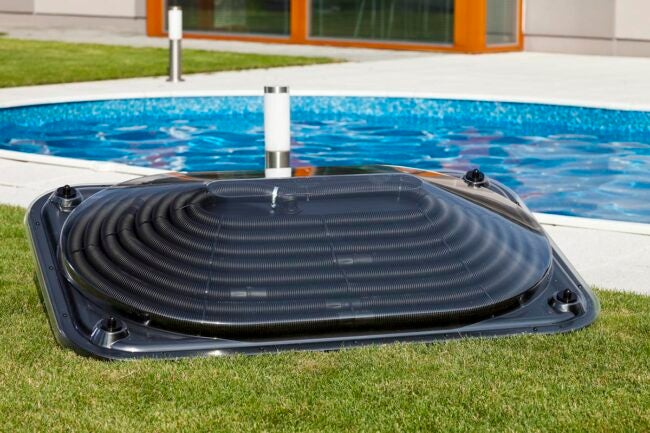
Photo: depositphotos.com
Pool heaters keep the water nice and comfortable for you and your loved ones to enjoy. Although they have been used in various forms for decades, there have been plenty of innovations in some of the best pool heaters. They come in gas, electric, or solar-powered types, and each has strengths and weaknesses, with electric falling between gas and solar for effectiveness and energy conservation.
Choosing the best pool heater for your pool means considering the size of the pool, the type of pool (above-ground or in-ground), and the average temperatures where you live. This list of recommended pool heaters considers these factors, plus type, value, and ease of installation.
- BEST OVERALL: Raypak 336K BTU Digital Ignition Natural Gas Heater
- RUNNER-UP: Hayward W3HP21404T Pool Heat Pump, 140,000 BTU
- BEST BANG FOR THE BUCK: SunQuest 2-2’x12’ Solar Swimming Pool Heater
- BEST ABOVE-GROUND: Fafco Solar Bear Economy Heating for Above-Ground
- BEST IN-GROUND: Hayward W3H250FDP Universal H-Series Heater
- BEST ELECTRIC: FibroPool FHO55 In Ground Swimming Pool Heater
- BEST PROPANE: Hayward W3H150FDP H-Series 150,000 BTU Heater
- BEST ENERGY-EFFICIENT: Smartpool S601P SunHeater Solar Heating System
- BEST FOR COLD CLIMATES: Raypak 406K BTU Digital Ignition Natural Gas Heater
- BEST FOR SALT WATER: Hayward W3H400FDN Universal 400K BTU Pool Spa Heater
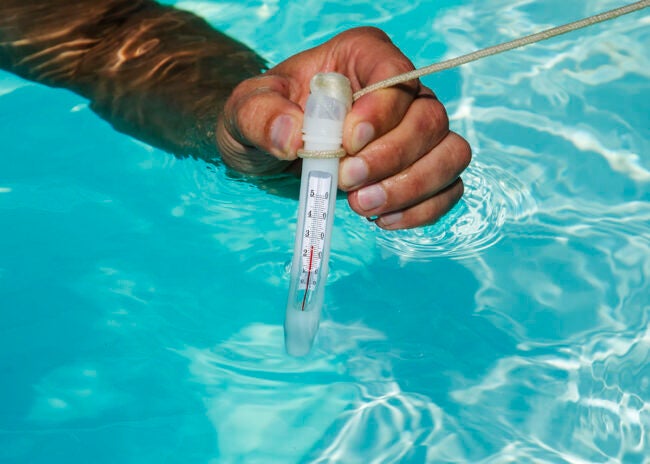
Photo: depositphotos.com
Types of Pool Heaters
Pool heaters come in three different types, which are differentiated by their power source. These include gas, solar, and electric heaters.
Gas
A gas heater uses propane or natural gas to quickly and effectively heat the water in your pool to the desired temperature. These powerful heaters are the most common method of heating pools in colder climates—those chilly spots that only give you a few months of swimming weather. They far surpass both electric and solar pool heaters in their ability to produce heat and in the amount of time it takes for them to heat up your pool. However, these heaters have a high initial cost plus the ongoing cost of natural gas or propane.
Solar
Solar pool heaters can be as basic as a fitted solar blanket that sits on top of the water to absorb and direct the energy from the sun. However, more effective solar pool heaters have been created that use a black or very dark tubing installed outside the pool, like on the roof of your house, to absorb heat from the sun. This heater draws in the water from the pool, forcing it through a series of heating tubes before returning the water to the pool at a warmer temperature.
Solar pool heaters are not very effective in colder climates, because they rely on heat energy from the sun and ambient heat energy in the air to warm up your water. However, they are the least expensive option and the most energy-efficient heater type available.
Electric
Electric heaters come in two types. The first is a direct flow heater that uses electricity to heat the water as it passes through the unit. This system is similar to a tankless water heater and doesn’t take up much space. However, electric heaters are quite expensive to own and operate, falling just below gas pool heaters in initial cost and exceeding them in ongoing electricity costs.
The second style is a heat pump-based electric header. These arent as effective in colder climates because this type relies on the ambient temperature in the air to heat the pool. This is similar to how an air conditioner cools your home, but the desired outcome has been reversed. These heaters are not exactly cheap, but they are less expensive than gas pool heaters.
What to Consider When Choosing the Best Pool Heater
Before choosing a pool heater for your pool, take a few minutes to educate yourself on the most important shopping considerations to keep in mind.
Location
The location of your pool heater seems like an odd thing to consider, but depending on the type of pool heater, you might have to use parts of your house or yard to install the heater.
- Gas pool heaters normally sit beside the pool or in a nearby utility shed so that they can connect easily to the water pump and filtration system. These heaters are larger than electric pool heaters, but require significantly less space than a solar heater.
- Electric pool heaters are about one-half to one-quarter the size of gas pool heaters and are typically installed beside the pool or with the pump and filtration system.
- Solar pool heaters take up the most space and the most planning prior to installation. Some solar pool heaters will sit alongside the pool, and others can go on fencing, decking, or even on a roof so that they can absorb the most heat possible. Always measure and properly plan out your solar heater layout to ensure you have enough space.
Pool Size
The size of your pool is a big consideration to keep in mind while shopping for your next pool heater because the larger the volume of the pool, the more energy required to heat the water to the desired temperature. Because of this, a solar pool heater is seldom used to heat a very large swimming pool. However, if you really like the idea of solar energy heating up your pool, you might use two or more solar heaters to provide enough power to warm the water.
For very large pools it is better to go with a gas pool heater or a powerful electric pool heater. Typically, pool heaters measure their heat potential in British Thermal Units, or BTUs. 1 BTU raises the temperature of 1 pound of water by 1 degree, so the higher the BTUs of a pool heater, the faster it can raise the temperature of the water.
Water Temperature in Season
Climate plays a significant role in choosing the best heater for your pool. If you live in a warmer climate, then you can choose just about any pool heater. However, you might not need the power of a large gas pool heater to keep the water temperature at the right level. In this case, an expensive gas pool heater would be a waste of money. For warmer climates, a solar pool heater or an electric heat pump that pulls heat in from the air is most beneficial.
If you live in a colder climate that needs the extra power of a gas pool heater, then you likely won’t get much use out of a solar pool heater or an electric heat pump because of the amount of solar energy and ambient heat in the air is much lower and unreliable.
Heat Conservation
Pool heaters are designed to direct the heat they produce into the water as it flows through the heater. To facilitate this, heaters are built to conserve the temperature of the water using insulating materials like foam or plastic. These feature prominently with solar pool heaters because they must be laid out in the open air to draw heat from the sun. However, doing so can also allow heat to escape from the water, so the materials used and the layout of the heating tubes must balance functionality with the conservation of the produced heat.
Heater Casing
Gas and electric pool heaters both have casings designed to keep the heater and the units within protected from water, moisture, impact damage, and temperature fluctuations. These cases also are insulated so that the water flowing through them does not lose heat before it exits the pump. They often are designed to look attractive so that they are not an eyesore in your yard. With solar pool heaters, you don’t have to worry as much about the casing of the unit because the bulk of a solar heater is not in a casing. Instead, it spreads across a wide area to absorb as much sun and heat as possible.
Flow Rate Calibration
Flow rate is the measurement of the volume of water that can pass through the pump within a given period of time. Flow rate calibration allows the owner to change the flow rate of the pool heater by increasing or decreasing the available space for water to flow within the system. Put simply, you are opening or closing the inlet or outlet valves to control the water flow.
This isn’t a common feature with pool heaters because the pump and filtration systems typically control the flow rate of the water. However, some pool heaters offer the option to calibrate the flow rate so that pool owners can optimize it to their preference.
Winterizing
Winterizing is the act of preparing your pool, pump, filtration system, pool heater, and any other pool components for freezing temperatures so that the hoses, brackets, filters, and internal parts do not bend and break because of ice.
Pool owners must completely remove solar pool heaters to safely winterize them, which is another reason solar heaters are not a great option for colder climates. Electric pool heaters and gas pool heaters both can be winterized by disconnecting the power source and hoses, emptying the water, storing the components safely through the winter, and blowing out any remaining water with a wet/dry shop vacuum or a leaf blower.
Ease of Installation
If you plan to take on this project yourself, it is important to consider how difficult it is to install the heater you choose.
- Solar pool heaters are time-consuming to install. Still, they are the easiest pool heater type for a DIYer to set up as long as there is plenty of space and you have the additional tools or ladders the job might require.
- Electric pool heater installation typically is best left to the professionals. Even if you connect the piping for the flow of the water, it is always better to have an electrician connect and confirm that the electrical system is working and safe, especially with electrical equipment around water.
- Gas pool heaters are the most difficult to set up because they often require both gas and electrical feeds. Like the electric pool heater, consider hiring a professional to ensure the gas connections are secure before using your pool heater.
Maintenance
Just like with any other part of your pool, the heater requires ongoing maintenance to keep it running efficiently, including winterizing (depending on geographic location), cleaning, and repairs. It is recommended that any type of pool heater should have at least one annual maintenance visit from a professional to ensure that the system is running correctly, though twice a year is better if the pool heater is being run all year long. If regular maintenance or heater failure is a concern, look to invest in a product with a long warranty period so that you can get replacement parts or even a replacement heater if necessary.
Our Top Picks
The products below were chosen for quality, price, type, and other shopping considerations to help you find one of the best pool heaters for relaxing in your warm pool.
Best Overall
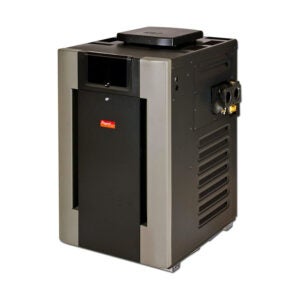
The Raypak 336K BTU Digital Ignition Natural Gas Pool Heater has an electronic ignition that automatically starts the heater when the temperature of the pool falls below the temperature that you set on the microprocessor-controlled thermostat. The LCD digital display clearly indicates this set temperature and provides accurate temperature readings so you can see how effectively the heater is warming the water.
This natural gas pool heater has a mid-range to high rating at 336,000 BTUs. This is partially because of the copper fin tube heat exchanger, made from a single piece of copper for maximum heat transfer potential. The pool heater also is compatible with most major pool control systems, but like most gas pool heaters, it has a higher price than electric or solar options.
Runner-Up
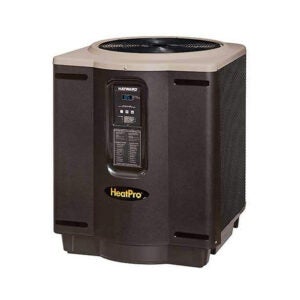
If you live in a warmer climate and like the energy efficiency of an electric pool heater, the Hayward W3HP21404T 140K BTU Electric Pool Heat Pump is just what you need. It has a titanium heat exchanger designed for optimal heat transfer and reliability, helping the heater to reach a maximum output of 140,000 BTUs. The heater also has an ultra-gold evaporator fin to help protect the internal components from corrosion, especially in very wet, humid environments, like coastal towns.
This electric pool heater has an injection-molded plastic body that resists ultraviolet radiation, rust, and deterioration, so it’s a long-lasting choice that’s easier to maintain. It features an acoustic compression cover on the heater casing and has a profiled fan for silent operation, a bonus for flexibility of location. This product comes in at a higher price than many gas pool heaters, but it has an energy-efficient design.
Best Bang for the Buck
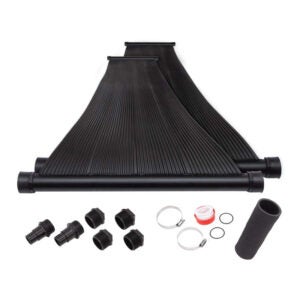
The SunQuest 2-2’x12’ Solar Swimming Pool Heater comes with two solar panels that measure 2 feet by 12 feet for a complete solar collector range of 48 square feet. This solar pool heater can heat an above-ground pool, or even a small in-ground pool, for a relatively inexpensive price when compared to gas heaters, electric heaters, and even some other solar heaters.
The SunQuest solar pool heater has 2-inch diameter headers to ensure that the flow of water through the system is not slowed down or interrupted by an insufficient pipe. It can be installed by handy DIYers who know their way around a pool, and possibly a roof, depending on where the heater will go. This heater can increase the standing temperature of pool water by up to 10 degrees Fahrenheit.
Best Above-Ground
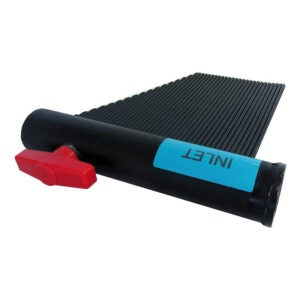
On average, above-ground pools require less energy to heat, and so are frequently paired with a high-quality solar pool heater like the Fafco Solar Bear Above-Ground Solar Pool Heater. This heater comes with a single solar collector that measures 4 feet by 20 feet so you won’t have to worry about losing energy between the gaps. The 2-inch headers are extra large in diameter so that you don’t slow down the circulation of your pool when the water runs through the heater.
The solar pool heater can be installed easily, and just about anywhere, with the included mounting caps, bases, and straps. Choose to install it on the ground, a custom-built rack, or your roof. However, the manufacturer recommends that it be positioned on an angle of between 10 and 30 degrees, facing toward the south for optimal heat collection. It should be installed where it will receive unobstructed sunlight between 10 a.m. and 4 p.m.
Best In-Ground
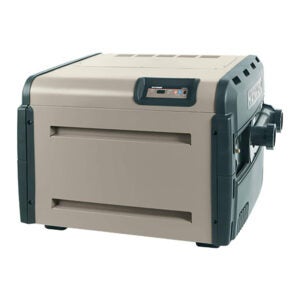
If you want a pool heater for your in-ground pool, the Hayward W3H250FDP Universal 250K BTU Propane Heater falls nicely between the power of a 400K BTU pool heater and the modest efficiency of a 150K BTU heater with an output of 250,000 BTUs. This propane pool heater has an easy-to-use LED control panel that displays a digital temperature readout, heater diagnostics, and a lockout feature that prevents the control panel from being used by unauthorized individuals.
The gas pool heater has a cupronickel (copper nickel) heat exchanger. The front panel is the only access point for maintenance and operation so you won’t have an issue placing the heater where it will be accessible from all sides.
Best Electric
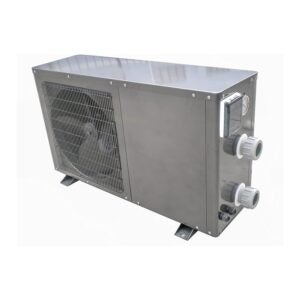
The sleek, enamel-coated steel casing on the FibroPool FHO55 In-Ground Swimming Pool Heater is designed to withstand wind, rain, sleet, sun, and snow so you can feel confident that the internal components of your electric pool heater are safe from the weather. The pool heater can warm up either in-ground or above-ground pools, but it only has a modest output of 55,000 BTUs, making it a poor choice for larger pools.
The heater uses 220-volt power, so you might need to hire an electrician for installation, but it features a digital display that lets you make quick and simple adjustments to the pool temperature settings. The electric pool heater uses a 100-percent titanium heat exchanger to ensure that swimming conditions are ideal as long as the outdoor temperature remains above 40 degrees. After the temperature drops below this point, the heater will be unable to keep up with demand.
Best Propane
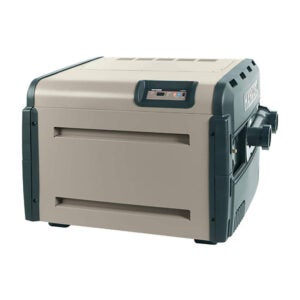
If you prefer the power of a propane pool heater, then this Hayward 150K BTU Propane Pool Heater might fit the bill. Accessible only from the front panel, it features an easy-to-use control panel for simple service, operation, and maintenance. This propane pool heater has an output of 150,000 BTUs, which is acceptable for large above-ground pools or smaller in-ground pools.
The gas pool heater has a cupronickel heat exchanger and a Hayward patented polymer header designed to help to reduce energy consumption. The forced draft combustion system moves air at a consistent rate within the combustion chamber to essentially eliminate outside weather variables, so that the heater doesn’t struggle in the wind or rain to keep your pool at the right temperature.
Best Energy-Efficient
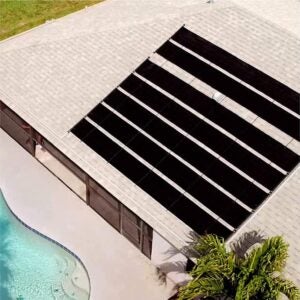
The Smartpool S601P Sun Heater Solar Heating System is an energy-efficient option if you have a long bungalow roof or a broad yard where you can install the 80 square feet of solar panels for ideal access to the sun. The panels are made of durable polypropylene and have individually fed collector tubes, with only one header hold for each heating tube. This system is relatively simple to install if you have the space, and it can increase the temperature of a pool by as much as 15 degrees Fahrenheit.
The polypropylene solar panels have fiberglass reinforced headers and wind vents to help keep the pool heater protected in windy conditions. Despite all of the great features of this product, its installation kit is sold separately.
Best for Cold Climates
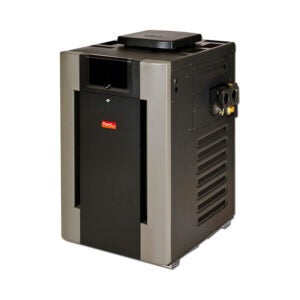
The colder it gets, the more powerful your pool heater needs to be, which is why the Raypak 406K BTU Digital Ignition Natural Gas Heater works in cooler climates. This natural gas pool heater has an excellent heat output rating of 406,000 BTUs and it uses an electronic ignition system to automatically turn the heater on when the temperature of the pool water drops below the temperature set on the thermostat.
The LCD digital display shows the temperature reading and can be used to increase or decrease the desired temperature. The internal components of the heater sit inside a polyester-coated cabinet, designed to keep water and moisture out so that you don’t have to worry about corrosion in poor weather. The heater also has a stainless steel tube where the water exits the unit to ensure that the water traveling from the heater to pool is rust-free.
Best for Salt Water
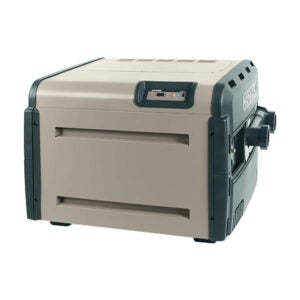
Owning a salt water pool comes with concern about corrosion to internal components from the salt, but the Hayward W3H400FDN Universal 400K BTU Pool and Spa Heater has a cupronickel heat exchanger for added protection. It can be used with both regular pool water and salt water without damaging parts.
The natural gas pool heater has a high heat output of 400,000 BTUs, allowing you to quickly and efficiently heat your pool. The heater comes outfitted with a simple-to-use LED control panel and a unique patented polymer header design for superior energy efficiency and protection against erosion in high-flow conditions.
FAQs About Your New Pool Heater
Read on below to find answers to some of the most frequently asked questions about pool heaters.
Q. Can I install a pool heater myself?
This depends on your level of technical skill, the type of pool heater you buy, the setup of your home (such as whether you have available natural gas lines), and the individual pool heater. Some heaters, especially solar pool heaters, can definitely be installed by a DIYer with experience, but in general, you want a professional to set up your pool heater so they can test it and ensure that it is working correctly.
Q. Are pool heaters noisy?
Some pool heaters, especially gas-fueled products, can have a noisy operating level, but most pool heaters are relatively quiet, with large, insulated bodies that muffle the sound they produce.
Q. Can pool heaters be repaired?
Yes, assuming that the damage done to the pool heater is not severe enough to completely disable or destroy the heater, then its components should be able to be replaced or repaired. Though again, it is better to leave something like this to a pro to ensure that you get the heater working properly and safely.
Q. Is it recommended to leave a pool heater on overnight?
Absolutely leave your heater on overnight. In fact, if you turn your pool heater off at night, the lower temperatures outside will drop the temperature of the pool water, forcing the heater to work harder in the morning and costing you more money in gas or electric bills.
Q. How do you winterize a pool heater?
Winterizing is normally a process done with gas pool heaters used in climates where freezing temperatures occur. To winterize your pool heater, follow these five steps:
- Turn off the gas flow to the heater using the valves on the gas line.
- Turn off the heater.
- Open the pressure switch (you do not need to remove it entirely).
- Open and remove all drain plugs, ensuring that you put them in a safe space for storage until you reopen the pool.
- Blow out the heater with a shop vacuum or leaf blower to get all remaining water out of the heater so there is nothing left inside to freeze as temperatures drop.
tinyurlis.gdv.gdv.htu.nuclck.ruulvis.netshrtco.detny.im
مقالات مشابه
- DC اعضای گارد تست مثبت برای COVID پس از تظاهرات
- شرکت صادرات و واردات کالاهای مختلف از جمله کاشی و سرامیک و ارائه دهنده خدمات ترانزیت و بارگیری دریایی و ریلی و ترخیص کالا برای کشورهای مختلف از جمله روسیه و کشورهای حوزه cis و سایر نقاط جهان - بازرگانی علی قانعی
- بهترین ذغال برای کباب شما نیاز
- School Counselor at Kentucky Army Post Dies of COVID-19
- شرکت صادرات و واردات کالاهای مختلف از جمله کاشی و سرامیک و ارائه دهنده خدمات ترانزیت و بارگیری دریایی و ریلی و ترخیص کالا برای کشورهای مختلف از جمله روسیه و کشورهای حوزه cis و سایر نقاط جهان - بازرگانی علی قانعی
- شرکت صادرات و واردات کالاهای مختلف از جمله کاشی و سرامیک و ارائه دهنده خدمات ترانزیت و بارگیری دریایی و ریلی و ترخیص کالا برای کشورهای مختلف از جمله روسیه و کشورهای حوزه cis و سایر نقاط جهان - بازرگانی علی قانعی
- نحوه استفاده هات پلیت آزمایشگاهی
- روشهای جدید سئو در دنیای دیجیتال
- شرکت صادرات و واردات کالاهای مختلف از جمله کاشی و سرامیک و ارائه دهنده خدمات ترانزیت و بارگیری دریایی و ریلی و ترخیص کالا برای کشورهای مختلف از جمله روسیه و کشورهای حوزه cis و سایر نقاط جهان - بازرگانی علی قانعی
- USS فورد هوانورد مشاوره پس از پوشیدن پچ به تصویر می کشد یک خفاش به عنوان "چین جدیدترین حامل'